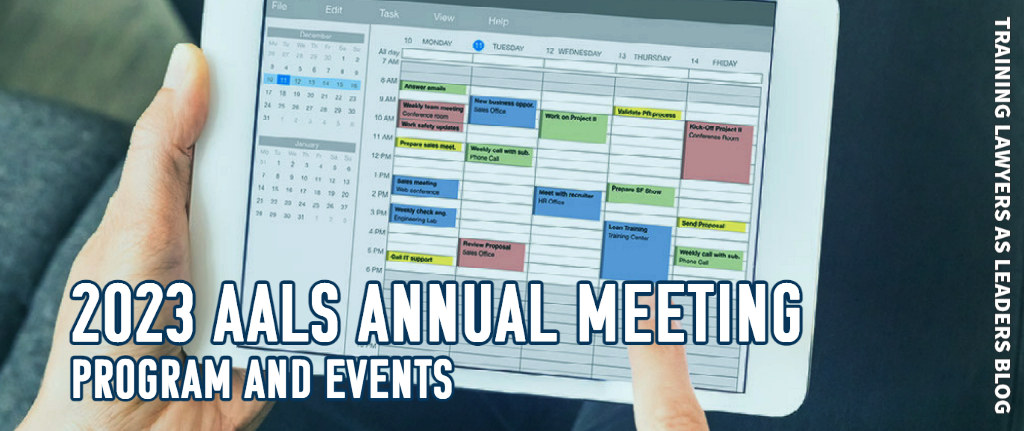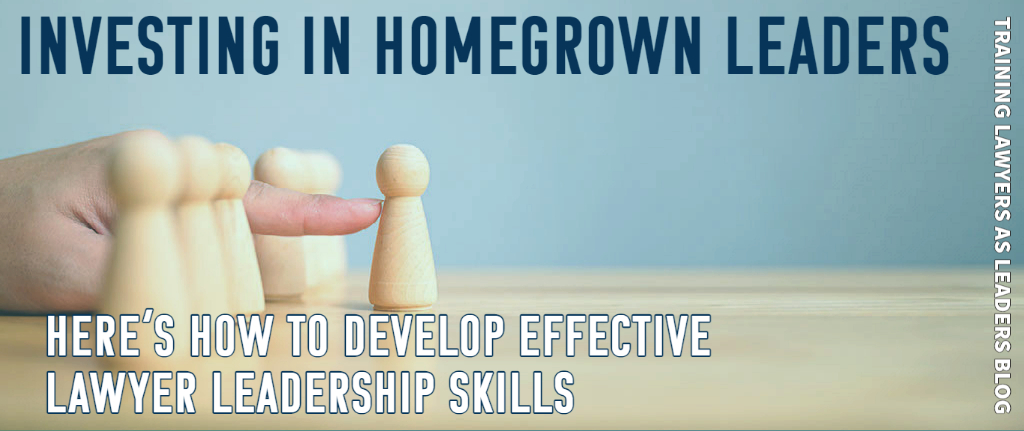
We are getting excited about the upcoming programming at the 2023 AALS Annual Meeting! Below we have highlighted the Leadership Section’s programming and co-sponsored programming, along with some other panels that we thought you might find interesting. Hope to see you in San Diego!
Primary Leadership Section Programming:
How Teaching Leadership Can Make a Difference
Date/Time: January 7, 2023, 8:30 am – 10:10 am
Description: This year’s conference theme challenges us to think about how law schools and each of us as academics can make a difference and bring about positive change. Cultivating a leadership mindset in the next generation of lawyers is one of the most significant ways law schools can make a meaningful impact in the work around us. Leadership development is a critical part our professional responsibility and a lawyer’s greater duty to advance justice in our society. This panel will discuss the ways that leadership education in our law schools can bring about positive change in our organizations, government, and society.
Panelists:
April M. Barton
Organization: Thomas R. Kline School of Law of Duquesne University
Erwin Chemerinsky
Organization: University of California, Berkeley School of Law
Farayi Chipungu
Organization: Harvard Kennedy School of Government
Garry W. Jenkins
Organization: University of Minnesota Law School
Angela I. Onwuachi-Willig
Organization: Boston University School of Law
Hillary A. Sale
Organization: Georgetown University Law Center
Co-Sponsored Program: Incorporating Access to Justice & Pro-Bono Across the Law School Curriculum, Section on Pro Bono and Access to Justice
Date/Time: January 5, 2023, 3:00 pm – 4:40 pm
Description: Access to justice and pro bono service can be an effective lens through which to explore any law school subject, and yet most law professors do not include them in their syllabi. This session features faculty whose courses provide students with insight into how lower-income people navigate the legal system and the ways in which that may differ from what we learn in casebooks. Attendees will leave with practical and replicable tools to integrate access to justice and pro bono service across the law school curriculum.
Other programs that involve leadership topics that you may want to attend:
1. Clinics and Institutional Commitment to Diversity, Equity, Inclusion, and Belonging, Clinical Legal Education Section
Date/Time: January 4, 2023, 1:00 pm – 2:40 pm
2. Critical Leadership, Accountability, and Justice Within Organizations, Civil Rights Section and Minority Groups Joint Program
Date/Time: January 6, 2023, 10:00 am – 11:40 am
Description: Lawyers and the organizations they lead have a duty to care for justice. This duty is important to accomplish justice, but also to justify the legitimacy of organizations and their lawyers. This duty requires that lawyers address and demonstrate progress toward social inequities, including problems of access, equity, discrimination, and under-representation of diverse constituencies. How do lawyers work for justice inside organizations? How can lawyers leverage their organizational roles and capabilities toward justice? How can lawyers hold their institutions accountable to act authentically to advance justice? What can leaders do to enhance and effectuate justice that is not performative?
3. How Law Schools Can Make a Difference: DEI work in the Curriculum, in the Classroom, and in the Courtroom, AALS Symposium Program
Date/Time: January 6, 2023, 1:00 pm – 4:40 pm
Description: Changes in ABA standards have led to more inclusive and equitable law school curricula, which in turn have significantly impacted law school faculty and administrations, the practice of law, and the judiciary. This symposium will address the changes taking place, offer practical guidance for navigating these changes, and discuss how these changes affect the judiciary and the practice of law.
4. The Judiciary—Making the Least Democratic Branch of Government More Respected, Less Political, Litigation Section
Date/Time: January 6, 2023, 1:00 pm – 2:40 pm
Description: The Judicial Branch is the least democratic branch of government. This program will focus on balancing populism, politics, and qualifications in selecting judges (appointment, election, merit screening, and confirmation hearings); periodic performance review (terms, term limits, life tenure, retention elections, impeachment); recusal and peremptory strikes; other legitimacy concerns (court-packing). How do politics, qualifications, and merit screening affect the preference for judicial appointment or judicial elections? Are term limits an effective brake on the politicization of the judiciary, or is life tenure preferable? Can stricter recusal requirements be implemented, and would failure to recuse be severe enough to justify impeachment?”
5. What a Difference a Difference Makes: Empowering Students through Self Determination Theory, AALS Discussion Group
Date/Time: January 7, 2023, 1:00 pm – 2:40 pm
Description: Law students arrive at law school excited to make a difference. Through a combination of (mostly unintended) factors, law schools manage to extinguish that excitement. We will discuss how to rekindle that excitement and create a long-burning passion for making a difference. We will consider the potential of self-determination theory, which teaches us that adults learn best when they are aware of their connections to others, their own autonomy, and a sense of competence. We will discuss how much we are doing to foster these principles in all areas of our law school education and what more we could do.
These sessions were the ones that stuck out to us in our quick review of the program. Are you speaking in a session? Which sessions are you particularly excited about? Please include these sessions in the comments below!









